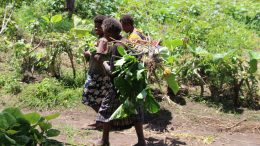
Vanuatu – The Society of Mary (Marists) established the Tutu Rural Training Centre (Tutu) on the island of Taveuni (Fiji) in 1969. In 1983 they started running a Young Farmer Training Course “to help form and train young single men from the province of Cakaudrove”. Running now for 35 years and training more than 200 men, the results have been spectacular, with more than 90% of course participants still do farming as their main source of livelihood. Around 2,000 people have completed some form of training at Tutu and another 25,000 adults have attended shorter village-based training courses run by the Centre. Having designed their own unique approach to training, the ‘Tutu model’ is recognised across the Pacific as best practice, with significant ability to be replicated in other countries.
On the island of Tana in Vanuatu, the Napil Rural Training Centre (Napil) was established in 1999 to offer a range of vocational training to local communities. Largely underutilised, Napil underwent a revitalisation in 2011 after Farm Support Association Manager, Peter Kaoh, and the Napil Lead Trainer, Tom Iotil, visited Tutu. Recognising that the Tutu model can be applied to Napil, they were determined to create a pilot youth in the farming training program.
Upon returning to Vanuatu, a three-year Vanuatu Young Farmers Development course was designed, in collaboration with the local communities, and commenced in 2012 with eight participants. The participants are between 18 and 30 years old and are mostly selected from the local villages. A condition of entry into the course is a signed agreement with the participant’s parents and village chief that land will be allocated to them for a period of at least three years. The area allocated can vary between ¼ and ½ of a hectare. These land agreements are critical components of both the Tutu and Napil courses.
Skip forward to 2014 and the Farm Support Association requested technical assistance to undertake a review of the Napil Rural Training centre and assess the effective application of the Tutu model in terms of providing self-employment in rural agriculture. A second review was carried out in 2016.

The reviews found that the Tutu model has been generally well applied at Napil and that the trainees are starting to reap the benefits. Fresh vegetables are being produced and sold on local Tanna markets, providing cash income and enhancing nutrition. The impacts are being felt beyond the Napil trainees, with seeds, seedlings and nursery supplies now becoming available to local farmers, and more sustainable and productive farming systems are being introduced. The arrangements at Napil are seen as pioneering for Vanuatu in terms of the involvement of village-based youth in commercial agriculture, particularly with respect to young women.
These successes are based upon a good understanding of the key principles of the Tutu model, which has enabled successful adaptation to the specific circumstances found on Tanna. The ongoing sharing of experiences between Napil and Tutu has been vital and highlights the importance of regional networks of farmer organisations for transferring successful practice within the region. #
About MTCP2
The Medium-Term Cooperation Program Phase 2 (MTCP2), a five-year capacity building program supported by the International Fund for Agricultural Development (IFAD), the Swiss Agency for Development and Cooperation (SDC), and the European Union (EU), has been implemented in 19 countries across three sub-regions—Southeast Asia, South Asia, and the Pacific—engaging 1,544 sub-national farmers organizations (FOs) with a total membership of around 22 million farmers. The funding support (total budget of $ 5 million for the whole duration of the project across 19 countries) serves as a catalytic fund that will allow FOs to enhance their capacity to be effective channels of economic services to farmers. The program has contributed to the formation of the strong national platform of FOs with improved capacity to engage in policy processes and mobilize resources from mainstream agricultural development programs like extension services, credit, and pre and post-harvest facilities. The program also helped in transforming farmers’ associations into commodity-based cooperatives to strengthen the role of small-scale farmers within an inclusive and sustainable value-chain. The program is being implemented by the consortium Asian Farmers’ Association for Sustainable Rural Development (AFA) and La Via Campesina (LVC).

Comments are closed